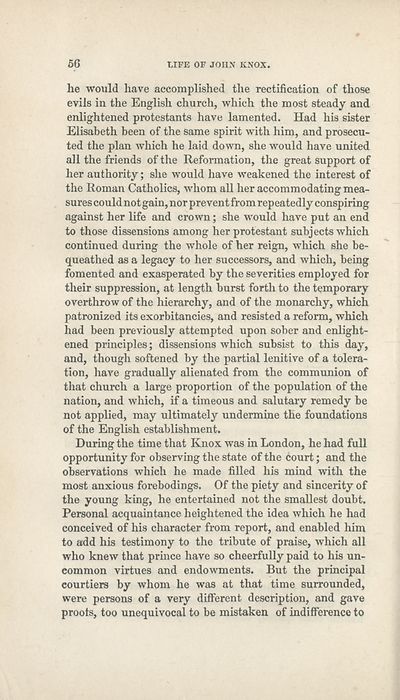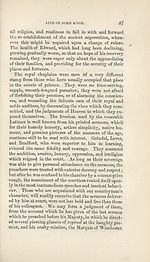Download files
Complete book:
Individual page:
Thumbnail gallery: Grid view | List view

LIFE OF JOHN KNOX.
he would have accomplished the rectification of those
evils in the English church, which the most steady and
enlightened protestants have lamented. Had his sister
Elisabeth been of the same spirit with him, and prosecu¬
ted the plan which he laid down, she would have united
all the friends of the Reformation, the great support of
her authority; she would have weakened the interest of
the Roman Catholics, whom all her accommodating mea¬
sures could not gain, nor prevent from repeatedly conspiring
against her life and crown; she would have put an end
to those dissensions among her protestant subjects which
continued during the whole of her reign, which she be¬
queathed as a legacy to her successors, and which, being
fomented and exasperated by the severities employed for
their suppression, at length burst forth to the temporary
overthrow of the hierarchy, and of the monarchy, which
patronized its exorbitancies, and resisted a reform, which
had been previously attempted upon sober and enlight¬
ened principles; dissensions which subsist to this day,
and, though softened by the partial lenitive of a tolera¬
tion, have gradually alienated from the communion of
that church a large proportion of the population of the
nation, and which, if a timeous and salutary remedy be
not applied, may ultimately undermine the foundations
of the English establishment.
During the time that Knox was in London, he had full
opportunity for observing the state of the court; and the
observations which he made filled his mind with the
most anxious forebodings. Of the piety and sincerity of
the young king, he entertained not the smallest doubt.
Personal acquaintance heightened the idea which he had
conceived of his character from report, and enabled him
to add his testimony to the tribute of praise, which all
who knew that prince have so cheerfully paid to his un¬
common virtues and endowments. But the principal
courtiers by whom he was at that time surrounded,
were persons of a very different description, and gave
proofs, too unequivocal to be mistaken of indifference to
he would have accomplished the rectification of those
evils in the English church, which the most steady and
enlightened protestants have lamented. Had his sister
Elisabeth been of the same spirit with him, and prosecu¬
ted the plan which he laid down, she would have united
all the friends of the Reformation, the great support of
her authority; she would have weakened the interest of
the Roman Catholics, whom all her accommodating mea¬
sures could not gain, nor prevent from repeatedly conspiring
against her life and crown; she would have put an end
to those dissensions among her protestant subjects which
continued during the whole of her reign, which she be¬
queathed as a legacy to her successors, and which, being
fomented and exasperated by the severities employed for
their suppression, at length burst forth to the temporary
overthrow of the hierarchy, and of the monarchy, which
patronized its exorbitancies, and resisted a reform, which
had been previously attempted upon sober and enlight¬
ened principles; dissensions which subsist to this day,
and, though softened by the partial lenitive of a tolera¬
tion, have gradually alienated from the communion of
that church a large proportion of the population of the
nation, and which, if a timeous and salutary remedy be
not applied, may ultimately undermine the foundations
of the English establishment.
During the time that Knox was in London, he had full
opportunity for observing the state of the court; and the
observations which he made filled his mind with the
most anxious forebodings. Of the piety and sincerity of
the young king, he entertained not the smallest doubt.
Personal acquaintance heightened the idea which he had
conceived of his character from report, and enabled him
to add his testimony to the tribute of praise, which all
who knew that prince have so cheerfully paid to his un¬
common virtues and endowments. But the principal
courtiers by whom he was at that time surrounded,
were persons of a very different description, and gave
proofs, too unequivocal to be mistaken of indifference to
Set display mode to:
![]() Universal Viewer |
Universal Viewer | ![]() Mirador |
Large image | Transcription
Mirador |
Large image | Transcription
| Antiquarian books of Scotland > Scotland/Scots > Life of John Knox ; and, The life of Alexander Henderson > (74) |
|---|
| Permanent URL | https://digital.nls.uk/131833192 |
|---|
| Description | Thousands of printed books from the Antiquarian Books of Scotland collection which dates from 1641 to the 1980s. The collection consists of 14,800 books which were published in Scotland or have a Scottish connection, e.g. through the author, printer or owner. Subjects covered include sport, education, diseases, adventure, occupations, Jacobites, politics and religion. Among the 29 languages represented are English, Gaelic, Italian, French, Russian and Swedish. |
|---|

